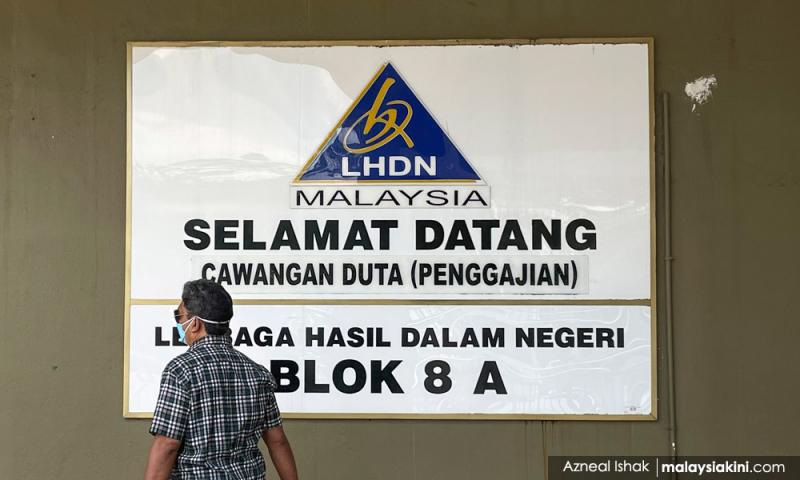LETTER | Reform tax system to increase govt revenue
LETTER | The political and taxation system in Malaysia as well as almost the whole world is overly friendly and one-sided in terms of taxation and legislation towards the rich, foreign investors, and multinational companies (MNCs).
Most in this class only care about wealth for themselves and their shareholders and are unconcerned about the socioeconomic quality and welfare of average citizens.
They do not feel any responsibility to contribute part of their wealth through proper taxation towards the socioeconomic development of average citizens.
Instead, they focus on ways to pay as little tax as possible or avoid paying altogether to maximise their profits.
As a result, many governments - including Malaysia - compete with each other to impose the lowest level of taxation and lax legislation in order to attract investment and trade from this wealthy class.
This very low level of taxation is one of the main factors why these governments do not have enough financial resources to spend on socioeconomic development of average citizens. This in turn widens the socioeconomic inequality gap between the wealthiest and average citizens in general.
This political and taxation system is unsustainable in the long term because the more the inequality gap widens, eventually, there will be social unrest among average citizens and they will begin to realise that this biased political system is the main cause of their socioeconomic problems.
This in turn threatens the government’s stability. Therefore, for the sake of the people’s wellbeing, the achievement of strong public support for the government, as well as the government’s long-term stability, Malaysia’s taxation system needs to be reformed such that it prioritises the socioeconomic quality of average citizens.
The steps below need to be implemented together with other Asean nations, collectively as well as gradually, in order to avoid the withdrawal of investments and the flight of the wealthy class to other countries in the bloc to avoid paying higher taxes and complying with stricter legislation.
1. All Asean countries need to collectively and gradually change the tax structure of capital gains, both realised and unrealised, by charging notional equity interest on the assets of the richest people in their respective countries.
Capital gains are taxes levied on profits earned on the sale of assets, which have increased in value over the holding period. By charging notional equity interests, the government gets a percentage share in those taxed assets.
This eliminates the difficulty of valuating complex assets in order to tax them, as well as the incentive by the wealthiest to indefinitely delay selling (realising) their assets in order to avoid paying capital gains on those assets.
If those people take the money saved from tax deferrals and reinvest it in their other businesses or properties, the government will also get a portion of that reinvested money.
The level of this form of taxation will grow based on the rate of return generated by those assets that are subjected to the notional equity interest, regardless of whether the rate is positive or negative.
2. All Asean countries need to collectively and gradually increase the corporate income tax on high-income companies in their respective countries.
3. All Asean countries need to collectively and gradually increase the income tax on the rich class (T20) in their respective countries.
4. All Asean countries need to collectively and gradually impose an inheritance tax on T20 in their respective countries. When an individual from the T20 passes away, and all his possessions (property, financial assets, bank accounts, tangible assets, etc) are transferred to another person, the inheritance tax will be charged towards the net value of all those transferred possessions and it has to be paid by those who inherit it.
5. All Asean countries need to collectively and gradually impose a property tax on the T20 in their respective countries.
6. All Asean countries need to collectively create a public registry for the beneficial (true) owners of companies and trusts in their respective countries. This action will increase the level of transparency and can help solve the issue of concealing asset ownership by the wealthiest through the use of companies and trusts placed in tax havens.
Essentially, it helps solve the issue of tax evasion by the wealthiest.
7. Asean also needs to collectively introduce legislation in their respective countries which bans anonymous shell companies. This can prevent the hiding of assets by the richest people in these companies so that they can avoid paying taxes on those undeclared assets.
8. Finally, all Asean countries need to collectively and gradually implement the Debt Monetisation Strategy by starting with a small amount of debt.
This strategy is where Government Securities are sold to the country’s own central bank at a very low interest rate, such as 0.1 percent. Essentially, the government borrows from its own central bank.
This strategy will provide the government with the necessary funds without it having to undertake a huge debt burden.
With the acquisition of financial resources from implementing the above measures, the government will be able to spend on programs that improve the socioeconomic quality of average citizens, especially the B40 group.
Therefore, the government needs to reform the taxation system together with other Asean countries for the sake of the people’s well-being, the achievement of strong public support for the government, as well as the government’s long-term stability.
The views expressed here are those of the author/contributor and do not necessarily represent the views of Malaysiakini.
RM12.50 / month
- Unlimited access to award-winning journalism
- Comment and share your opinions on all our articles
- Gift interesting stories to your friends
- Tax deductable
